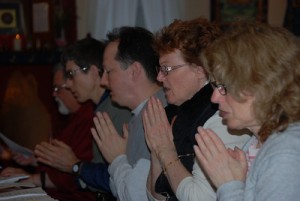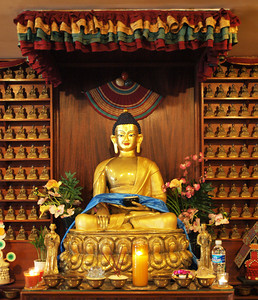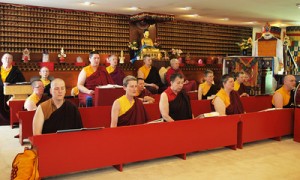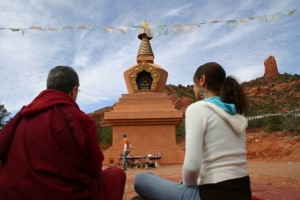An excerpt from a teaching by Jetsunma Ahkon Lhamo from the Vow of Love Series
One of the problems that we Westerners have is that we’ve grown up with religions that say God is external. That is not what the Buddha teaches. The Buddha teaches us not that our supreme object of refuge is an external God, but that ultimately, in the deepest sense, our supreme refuge is enlightenment, the uncontrived natural state free of desire. According to the Buddha’s teaching, it is possible to achieve realization; that desire-free state, that natural uncontrived wisdom state is attainable. According to which path you take, it is attainable in many lifetimes, it is attainable in some lifetimes, it is attainable in a few lifetimes, or according to the Vajrayana, with sincere practice it is attainable in one lifetime.
You have to decide for yourself what you’re going to do. It’s a difficult job, because we are so filled with ideas from our upbringing. People say, “I’m moved by what you say, but I just don’t know if I can renounce everything. I just don’t know if I can give everything up.” That’s not what’s being talked about here. What’s being talked about is that you have to determine your objects of refuge. You have to determine what your refuge is, and from that you should make your own decisions. There are many different levels at which you can practice. You can become a full renunciate, taking vows, taking robes. You can also practice in a more casual way, laying the pathway for eventual deeper practice. Nobody’s making a rule for you. The point is that you should think for yourself and you should think past the ways in which you were brought up. You should look courageously at suffering, at the causes for suffering, and at the end of suffering.
According to the Buddha’s teaching, there is nothing on this Earth that can end suffering for all sentient beings. If we found the cure for cancer, AIDS, for everything, something else would happen, because the karma of sickness is there. If we found the cure for poverty, something else would happen. If we found the cure for war…. and all these ifs are mighty big. The karma of suffering is desire. It is the root cause for all suffering. Having determined that, we have to think that to get rid of it from our mindstreams will take something more profound than manipulating our external environment. The problem cannot be solved in that way.
I think it behooves us as Westerners to think deeply about these things. From my point of view, I have seen Westerners adapt the Buddhist religion, and I am not satisfied in the way that they are doing it. They’re practicing Buddhists, they know the mudras, they know the mantras, and they know how to ring the bells. They know how to do all the ceremonial things that come with the Buddhadharma; and I am not happy with their minds. Because maybe they didn’t take long enough to decide for themselves what the object of refuge is and what the cause of suffering is.
You can collect Dharma in a materialistic way just as well as you can collect cars and TVs. You can collect Lamas and the blessings of Lamas in a materialistic way just as easily as you can do anything else. You can collect new thoughts and new ideas and spiritual truths and books and all kinds of things, and never change. Or you can come from a really pure place and examine these things with courage and with pure intention. You can be determined to awaken the seed and the fire of compassion in your mind by examining the suffering of all sentient beings. You can encourage that flame, that fire, fanning it into life so that it burns away all obstacles to your practice. And you’ll find for yourself your object of refuge, and you’ll go…just go. You can do that. It takes courage and it takes pure intention and it takes determination to really think about these things, in a logical and real way. That’s what I hope you will do.
I am a Buddhist, and I always will be. But I’m not trying to sell Buddhism. What I would like to see is a world without suffering. That is the point, hopefully, of all religions; certainly of mine. I wish to talk about the same thing Lord Buddha himself talked about: the causes of suffering and the end of suffering. If we start there, thinking of these things and thinking of them with what Buddhists call fervent regard, we can make a lot of progress.
Contemplating these things creates a great deal of virtue and merit. After you think about these things, please dedicate the time that you spent and the effort that you took, to benefit all sentient beings. In other words, offer the virtue or the merit that you have accomplished by even just wanting to love. There’s a tremendous amount of virtue in that. Offer that as food and drink to all sentient beings so that the karma of that can be shared with a world that is suffering.
Copyright © Jetsunma Ahkon Lhamo. All rights reserved




